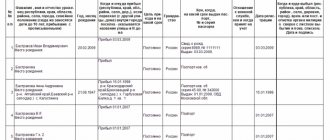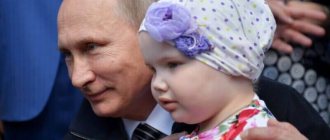Purpose of the housing program
The program is designed to solve the housing problem of citizens of the Russian Federation. The conditions for providing subsidies may differ depending on the region of residence of citizens. For example, in Moscow, funds provided by the state can be spent on:
- purchase of housing;
- purchase of housing during the construction phase;
- making a down payment on a mortgage or repaying the principal debt on a mortgage loan;
- to purchase a separate room in a communal apartment in addition to your own.
It is important to note that in order to receive a subsidy, you must have the status of a family in need of improved housing conditions. This status is assigned by the local administration based on the package of documents provided. Moreover, citizens in need of improved housing conditions do not necessarily have to have the status of a low-income family to receive a housing subsidy.
The subsidy is targeted and provided free of charge from the federal or regional budget on a first-come, first-served basis.
What benefits and benefits can a low-income family claim?
If we were able to figure out a little how to obtain the status of a low-income family, let's talk about what benefits people with the status in question can claim. Low-income families can receive a whole list of useful benefits and benefits. For example, low-income families can count on a special child benefit, which is issued every month. Separately, low-income families are entitled to a monthly cash payment for children 3-7 years old. Children can also be sent to a short-term stay group.
Housing problems will also be partially solved, since low-income families can count on a subsidy, which must be spent on covering utility bills. The state also helps low-income families get better housing or improve their existing property.
Students receive a social scholarship from the state, and guests of Crimea, Krasnodar, Altai and Stavropol Territories do not have to pay a resort fee. Not to mention the fact that the persons in question will receive significant material, clothing and food assistance from the state in 2022. And for some time now, families with this status are entitled to free legal advice.
For example, to receive food assistance, you need to have a special document - a notification from social workers. For owners of social media Muscovite cards; an electronic food certificate is produced. There are two thousand points on your balance, which are equivalent to the same number of rubles. They can be spent on purchasing groceries in some Moscow stores. If you don’t have a social card, you can also apply for a benefit. Only in this case, you don’t need to look for stores yourself. You can immediately receive a food package for the prescribed amount.
Also, in 2022, a low-income citizen can receive clothing assistance, that is, clothes, shoes, etc. Typically, such support is intended for senior citizens, the disabled, and families with children. In addition, assistance may be intended for the purchase of durable goods. In particular, for the purchase of such necessary household appliances as a refrigerator. Addressed social assistance for families with children, provides the opportunity to buy children's goods using accumulated points. If citizens do not have a social card, they will not be left without help. Just to get it, you will have to contact your local social service center.
A separate category of social assistance is a monthly allowance for children in low-income families. You can get it for each child until he turns 18 years old. To receive it, you need to submit an application. Both parents and guardians of the child can do this. Increased benefits will be received by single parents, the parents of a child for whom the second parent does not pay child support (evades them), the parent of a child whose second parent is a military serviceman (sergeant, sergeant major, soldiers and cadets). But families cannot simultaneously receive payments for children 3-7 years old and benefits as low-income people.
Who has the right to claim the status of “poor”
Each Russian region has its own procedure for recognizing a low-income family.
It depends on funding and the level of the minimum subsistence level. Most often, the following apply for the status of “poor”:
- Families with only one parent;
- With 2 parents, one or both of whom are not officially employed or have a low income;
- Large families;
- Families with pensioners or disabled people.
Social protection authorities evaluate total family income, property, and housing availability in each specific case.
What income is accountable? These are wages, children's wages, benefits and scholarships, disability benefits, old-age pensions, and other payments.
Documents to confirm status: passports of all adult family members, birth certificates of children, marriage certificate, certificate of family composition, documents on income of all family members, account details, disability certificate, pension certificate and others.
Monthly benefits for low-income families
The very fact of recognizing a family as low-income does not give the right to receive benefits, since it is not provided for either at the federal level or in the regions.
However, low-income families can receive one-time or periodic cash assistance, as well as necessary food, medicine and other things. This type of support is called social assistance.
Another important point is the opportunity to receive federal and regional payments for children.
One of the federal payments is child care benefits for up to 1.5 years. It can be received by one of the working parents or close relatives who is officially employed. In this case, the payment is made by the FSS.
ConsultantPlus experts explained how child care benefits are paid for children up to 1.5 years old. Get free demo access to K+ and go to the Ready Solution to find out all the details of this procedure.
How to apply for a housing subsidy
In accordance with Art. 51 of the Housing Code, citizens are recognized as in need of improved housing conditions if:
- None of the family members are the owner or tenant of the housing (there is no certificate of ownership or social tenancy agreement).
- Citizens live in a house that does not meet the requirements established for residential premises (apartment).
- A citizen with a severe form of chronic disease lives in the same apartment.
- Rented or own housing does not meet the living space standards for 1 person.
These factors are the basis for registering the poor with local authorities. The new apartment (house) must meet the following requirements: the area must correspond to the established standard; due to its increase, living conditions have improved.
Download for viewing and printing:
Article No. 51 of the Housing Code “Grounds for recognizing citizens as needing residential premises provided under social tenancy agreements”
Important! If the registration norm for housing area has changed in the region, and the family is already registered according to the old norm, local authorities do not have the right to remove the family from the queue for an apartment.
If the applicant deliberately worsened his living conditions (exchanged the apartment for a smaller one, registered strangers, sold his share, got a fictitious divorce), he is denied benefits for the next 5 years.
Procedure for receiving cash payment
To register, not only identification documents for all adults and children, but also documents ensuring the receipt of benefits are submitted to the local government authority.
The list of documents required for registration may differ depending on the region of residence. Check with your local administration for the exact list. Additional documents:
- Certificates from the cadastral, registration chamber, technical inventory bureau (they confirm the fact of the absence of real estate);
- Parents need to contact their house management for certificates confirming their family composition.
- Documents confirming the types and amount of income of all family members.
- Documents confirming the right to a preferential queue to receive a subsidy.
The decision is made within 1 month.
To receive a subsidy, low-income families must write an application to the housing fund at their place of residence, indicating the chosen method of improving housing conditions. For example, in Moscow the following methods are provided: concluding a social rental agreement, concluding a free use agreement, providing subsidies and social mortgages.
Benefits for low-income families
In today’s material, we consider the support measures that the state has established for low-income families and the procedure for receiving them.
Content:
Which families are considered low-income? What benefits are provided for low-income families? 1. Federal monthly allowance for the first and second child 2. Free state legal assistance 3. Federal tax benefits 4. Benefit for housing and communal services 5. Federal benefit - improvement of living conditions 6. Federal educational benefits 7. Regional benefits Where to go to apply for benefits?
Which families are considered low-income?
In accordance with current legislation, low-income families are those families in which the average income for each member (average per capita income) is lower than the subsistence level stipulated by the constituent entity of the Russian Federation. To calculate the average per capita income, the following formula is used, where D = the amount of income for the last 3 months; X = number of family members:
1 / 3 * D : X = average per capita income
The minimum wage in 2021 throughout the country cannot be less than 12 thousand 130 rubles. At the regional level, each entity sets its own minimum wage in accordance with the economic situation and other factors. For example, in Moscow the minimum wage is 20 thousand 195 rubles, in St. Petersburg - 18 thousand, and in most cities of the country it rarely differs from the minimum wage provided at the federal level.
Example: there are 4 people in the Ivanov family. Maria Ivanova’s income from wages over the last three months amounted to 90 thousand rubles, and her husband Evgeny Ivanov earned 240 thousand rubles from business activities. They have two minor children. In total, Maria and Evgeniy earned 330 thousand rubles. Next, we divide this number by 3 and get 110 thousand. Then we divide the result by 4, the result of which is 27 thousand 500 rubles. This amount of money is the average per capita income of the Ivanov family. The family lives in the Tula region, where the minimum wage is 14 thousand 100 rubles. As you can see, the average per capita income of the Ivanovs exceeds the regional minimum wage, and therefore they are not poor.
When determining the wealth of a family, the income of each of its members during the three months preceding the filing of the application is taken into account. For example, if you apply in June, your family's income for March, April and May will be taken into account. Income taken into account when calculating is available at the link
. The main criterion for classifying a citizen as a family is their cohabitation: members of a low-income family can be spouses, parents and their children, brothers, sisters, and so on. It should be noted that when calculating income, military personnel who are in service and have not entered into a military contract are not included in the family composition. They also do not include people in prison, on compulsory treatment, and citizens who live entirely on state support.
What benefits are provided for low-income families?
The fundamentals of organizing social assistance to low-income citizens are enshrined in Federal Law No. 178-FZ of July 17, 1999. Social assistance to low-income families can be expressed in one-time and regular payments. Benefits are also divided into federal and regional.
Federal monthly benefit for the first and second child
For families whose average per capita income is below 1.5 minimum wages, a monthly allowance is provided for the first and second child, provided that he was born after January 1, 2021 (from the date of entry into force of the relevant law). It should be noted that the benefit is not intended for the third child, since other government programs are provided for large families. The recipient of financial support is the child's mother, and the child must have Russian citizenship. Payments are made every month and amount to one subsistence minimum per child in the family’s region of residence. For example, in the Rostov region, families receive 10 thousand 501 rubles. The exact amount of payments in your region can be found on the official website of the Pension Fund. It should be noted that the federal budget pays for the first child, and money for the second child is deducted from maternity capital. If a family has spent all maternity capital, it will not be able to receive money for a second child.
Free state legal assistance
A low-income family has the right to free legal assistance in any region of our country. Legal services are provided free of charge by government offices, legal assistance centers, and lawyers who participate in the free legal aid program. To take advantage of this benefit, you must provide a passport and a certificate of average per capita income, which is issued at the MFC. The provision of free legal assistance is regulated by the Federal Law “On Free Legal Assistance in the Russian Federation.” Having a passport and income certificate in hand, you can safely go for the legal protection required by law.
Federal tax incentives
In accordance with Art. 217 of the Tax Code of the Russian Federation, low-income families should not pay personal income tax on social benefits and allowances. In Art. 333.35 of the Tax Code of the Russian Federation stipulates that low-income families do not have to pay state duty for transactions related to real estate.
Benefits for housing and communal services
In accordance with Art. 159 of the Housing Code of the Russian Federation, subsidies for housing and utilities are provided to families whose expenses for housing and communal services exceed the permissible share of citizens’ expenses for housing and utilities in the total family income. For families with an average per capita income below the established subsistence level, the maximum allowable share of expenses is reduced in accordance with an adjustment factor equal to the ratio of the family's average per capita income to the subsistence level.
Federal benefit - improvement of living conditions
In accordance with Art. 51 of the Housing Code of the Russian Federation, families that are recognized as needing housing are given the opportunity to obtain real estate under a social rental agreement.
Federal educational benefits
Schoolchildren have the right to receive free meals, as well as travel on public transport. In addition, children have the advantage of priority admission to kindergarten. During the holidays they are provided with free trips to camps. Graduates have preferential conditions for admission to higher educational institutions, and students from low-income families are entitled to social scholarships.
Regional benefits
These benefits vary depending on the economic situation in the region and the government policy of the subject. It is not possible to consider all of them in this post due to the volume and variety of regulations governing this issue. But you can always find out about them in local multifunctional centers or in the social protection authorities of the subject.
Where to go to apply for benefits?
To confirm the status of a low-income family and apply for the benefits required by law, you should contact the population protection center at the place of registration. You can submit documents electronically through the State Services service or at the MFC.
Implementing a certificate
After receiving the subsidy, families must proceed in the following order:
- Open a bank account to transfer money from the certificate;
- Choose a real estate agency;
- Choose suitable housing;
- Complete the purchase and sale of an apartment and register it;
- Contact the state registration service, presenting the agreement, receipt and act;
- Provide an agreement to the bank for debiting funds to the home seller’s account;
- Sign the deed of transfer of the residential premises and take a receipt from the seller that the funds have been received by him.
After receiving the apartment registration certificate, it must be submitted to the housing fund that issued the subsidy. Improving living conditions serves as a fact for removing a family from the register.
Important! Having received a certificate for issuing money, the family must use it within a certain period of time. The implementation period for the subsidy is different in each region.
Possible problems
Difficulties sometimes arise when applying for benefits or subsidies. For example, when a family cannot provide social security with documents about the income of a missing relative. In this case, a certificate from the police about the initiation of a criminal case or a court decision will be required. Interested parties will have to file a police report.
Additionally, citizens may need a document from a university, medical institution, prison, or about serving under conscription (contract). The list of documents and possible difficulties with their preparation depend on the situation and type of state assistance.
Payments of benefits or subsidies are terminated upon expiration or if family income increases.
When can an applicant be deregistered?
In what cases is a family removed from the queue to receive a subsidy:
- She voluntarily refused to participate in the program;
- Lost the grounds for assigning a subsidy;
- Moved to another region (this point does not apply to residents of Sevastopol, St. Petersburg and Moscow);
- Received budget money to buy an apartment or build housing;
- Received land for the construction of housing (with the exception of large families with three children);
- Provided documents that did not correspond to the real property status or concealed papers confirming ownership rights.
Important!
If, while waiting, the applicant purchases (receives) an apartment (house) that is unable to improve living conditions or is unsuitable for living, this fact should not exclude low-income citizens from the queue. Temporary registration in another locality is also not a reason for refusal of subsidies. A citizen has the right to temporarily leave his place of registration in connection with work, treatment, or study in another city. This also includes temporary relocation due to fire, apartment flooding and other emergencies.
Terms of service completion
The time frame for consideration of an application depends on the legally significant action. For example, you can obtain the status of a low-income family in 8-10 days. However, the period may be extended indefinitely if the applicant has not provided all documents, and to obtain them it is necessary to contact government authorities.
The decision to pay benefits or provide a housing subsidy is made within 10 days. Whereas for financial assistance, a decision is made within 30 days (Moscow).
Support for the poor in the sphere of housing and communal services
Due to the regular increase in tariffs in the utility sector, the state at the regional level has introduced a special benefit for the poor - a subsidy for the payment of utility bills.
To be provided with it, low-income people must: be the owners of apartments or use them on the basis of social rent, as well as rent housing under a lease agreement or be registered in a housing cooperative.
Conditions that applicants must meet:
- They have no utility debt;
- The amount of their monthly utility payments is higher than the established norm. The norm is established in each region separately.
Important! When calculating the norm, the following are taken into account: the standard cost of services, the number of people, total income, previously issued utility benefits (in connection with retirement age, disability, large families, etc.).
Required documents
Social protection authorities provide subsidies for payment of housing and communal services based on the following documents:
- Passports and birth certificates of children.
- Certificates of paternity (if available).
- Certificates of marriage/divorce.
- Certificate of family composition.
- Documents confirming the income of all family members.
- Paid receipts for housing services with checks.
- Documents confirming the right to use residential premises (certificate of ownership, extract from the Unified State Register of Real Estate, lease agreement, social tenancy agreement, etc.).
- Certificates of absence of debts for payment of housing and communal services.
- Bank account details.
Additionally, documents are presented on the basis of which low-income people already receive utility discounts (identification of a pensioner, mother of many children, disabled person, Chernobyl survivor, veteran).
Methods of contact:
- personal written statement;
- use of email;
- government services portal.
The maximum processing time is 10 days.
To transfer money you need to open a bank account. The compensation is monthly, valid for 6 months, then it must be renewed.
Attention! It is possible to receive a money transfer in the current month if the application was written from the 1st to the 15th. If you apply for a benefit in the middle of the month, you can count on it from the next month.
If the applicant has category 1 disability, needs care, or is over 80 years old, he has the right to have compensation delivered to his home.
Required documentation when applying for benefits
To obtain assistance you will need the following documents:
- Statement.
- Applicant's passport.
- Certificate of income for the quarter.
- Excerpt from the house book.
- Documents on expenses incurred (treatment, funeral payments).
- Evidence of lack of income (certificate from the Central Employment Service, FSSP). Citizens need to be guided by the provisions of the Moscow GD dated December 28, 2004 No. 911-PP.
Sometimes additional documents may be required. More details about the types of assistance in Moscow and the list of documents for each of them are here.
Information about the financial status of the family must be confirmed annually, from January 1 to August 31. You can update your data on the website mos.ru or through the Central State Administration “My Documents”. The action is performed through your personal account.








